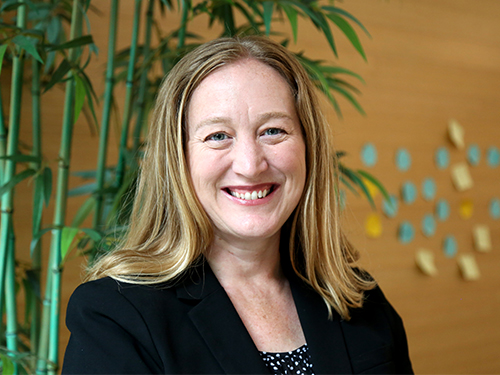
On October 1, Scientist Jessica Santos, PhD’15, departed the Institute for Economic and Racial Equity (IERE) and began a new professional chapter as the inaugural director of the Leah Zallman Center for Immigrant Health Research. The new center, named after late immigrant health scholar and physician Dr. Leah Zallman, is housed at the Institute for Community Health (ICH). Based in Malden, Massachusetts, ICH has a two-decade history of providing research and evaluation to support communities in achieving health equity.
Santos first joined the Heller School in 2011 as a PhD student and recipient of the Anne Ralen Brown Endowed Scholarship. With a professional background in community development and state government, Santos was interested in studying workforce development, racial equity, and immigrant integration policy. She joined the assets and inequalities PhD concentration (currently known as the economic and racial equity concentration) and worked closely with Janet Boguslaw, a senior scientist at IERE and Santos’ dissertation chair.
Maria Madison, IERE director, says, “Dr. Santos has had a profound impact on everyone she has worked with and mentored. Her loss will be profound but we are inspired and energized by her example. I am particularly excited about the work Jess is about to undertake with the Institute for Community Health at Cambridge Health Alliance. Our job at Heller is to launch change agents. Jess is a stellar Heller catalyst, making profound changes wherever she goes.”
After completing her PhD in 2015, Santos became a full-time researcher at IERE, where she worked closely with Thomas Shapiro, former director of IERE and David R. Pokross Professor of Law and Social Policy. Shapiro engaged her in national studies and networks in the assets field and offered her a platform from which she could develop her own work. Santos also developed her skills as an educator, teaching courses in the MPP, PhD, and HSSP programs; mentoring master’s students and serving on dissertation committees; chairing the economic and racial equity concentration of the MPP program; and even earning the Heller Teaching Award in 2018.
Shapiro says, "Jessica's vision, innovative skills, commitment to community, and passion are a perfect DNA for her next chapter. She is both a loss for Heller and an exemplar of who we can be as an institution. Cambridge is not far from Waltham!"
At IERE, Santos led applied research studies focused on improving the well-being of immigrant communities in New England and fostering economic and racial equity through participatory research. Together with national partners, she co-developed a portfolio of research and practice around Empowerment Economics, a critical framework for wealth- and power-building developed by and for Asian-Americans and Pacific Islanders and other communities of color, many of whom have histories of displacement and migration.
Says Santos, “I’ve always been interested in the idea that when immigrants and newcomers arrive, they invest in their new community. How do we build thriving communities that are inclusive and equitable for long-standing residents as well as newcomers?”
Susan Eaton, professor of the practice in social policy and a longtime collaborator of Santos, said, “Jessica’s research is shaped by her vision for a more equitable and just world and by her commitment to being informed by the people most harmed by social problems and/or most likely to directly benefit from various solutions. Her work is meticulous, rigorous and always brimming over with humanity.”
Under Santos’ leadership, the Leah Zallman Center will build on Dr. Zallman’s research legacy by investigating the contributions of immigrants to the health of U.S. society and analyzing the impacts of policy decisions on immigrant health. Santos is enthusiastic for the opportunity to engage in “on the ground” policy research with local partners and communities. Though she’ll spend her first year building the center’s research team and establishing new projects and partnerships, she’s already thinking ahead to growing the center’s capacity for education, training, and policy impact.
“The center is well-positioned to have direct conversations with policymakers and local community members, which I’m really excited about,” Santos says. “It feels like there are endless possibilities to do important work at the ground level and also at scale.”
Santos will maintain ties with the Heller School community as a visiting scholar, continuing her research in Empowerment Economics with a cohort of master’s and doctoral students she has trained in this innovative participatory research method. In the long term, she also intends to collaborate with Heller research faculty on new projects and hopes to establish a postdoctoral position at the Leah Zallman Center that could one day welcome Heller PhD graduates with expertise in immigrant health.
“Immigrant health is one of the issues we have to be paying attention to in the upcoming post-pandemic policy environment,” says Santos. “The Biden administration is increasing the annual refugee cap, which means that refugee resettlement agencies are building up local capacity that was lost during the Trump administration. The U.S. will see large numbers of evacuees, asylees, and other migrants from Afghanistan, Haiti and Central America this year, among others. We need to learn how to welcome newcomers and celebrate their strengths and contributions. My hope is to lead studies that reveal policy solutions to eradicate disparities in health and in the social determinants of health. In the end, policy solutions that improve systems and advance equity benefit all.”
